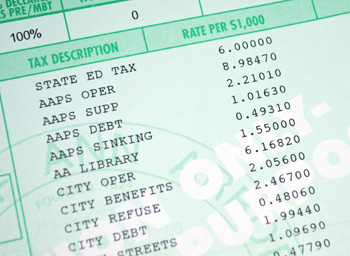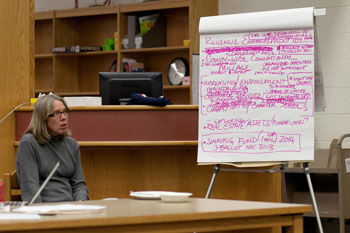
An Ann Arbor summer tax bill, showing some of the assessments for Ann Arbor schools. For Ann Arbor Public Schools (AAPS), the millage rates reflect half the amount collected annually.
Among Michigan’s public educators, the 2010-11 fiscal year is being called “The Cliff.” Based on a grim downward trajectory of funding from the state, decreasing revenues from local property taxes and expenses like health care continuing to climb, that’s the year many districts are expected to plummet over the edge into the red.
Robert Allen, deputy superintendent of the Ann Arbor Public Schools, described this scenario at a sparsely attended forum last Thursday at Huron High School, where he and superintendent Todd Roberts made a pitch for voters to support a proposed countywide millage on the Nov. 3 ballot. They didn’t claim that AAPS would be among those districts falling off the cliff, but they did say their district faces a $15 million deficit that year. Without new revenue from the millage, they contend that the district would need to make dramatic cuts, and that those cuts would almost certainly affect students in the classroom. Michigan’s financial crisis is hitting hard, they say.
“As the state goes, so goes our funding,” Allen told the group on Thursday.
The state isn’t going so well.
But opponents argue that school districts haven’t done enough to cut costs, and that taxpayers can’t absorb the added burden of another millage. Beyond that, people on both sides say there’s an urgent need to reform the way schools are funded in Michigan, regardless of the success or failure of the Nov. 3 millage vote.
This Chronicle report looks at how Michigan funds K-12 public schools, why local school districts say they need a special enhancement millage and why critics say they don’t, and what that proposed millage would entail. Ann Arbor Public Schools is the largest of Washtenaw County’s 10 school districts, and would receive over a third of the $30 million collected from the millage annually – we’ll focus our coverage on that district. [Full Story]





